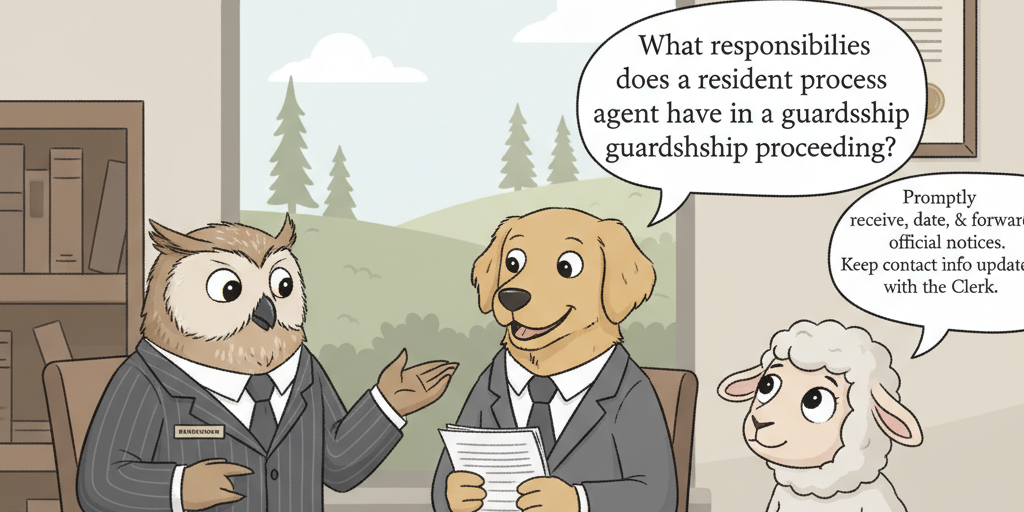What responsibilities does a resident process agent have in a guardianship proceeding? – North Carolina
Short Answer
In North Carolina, a resident process agent is a North Carolina resident appointed by a nonresident guardian to accept legal papers and official notices for the guardianship. The agent’s job is to promptly receive, date, and forward everything to the guardian and keep current contact information on file with the Clerk of Superior Court. The agent does not make decisions for the ward or act as a guardian; they are a local point of contact for service of process and court communications.
Understanding the Problem
You were appointed guardian in North Carolina, but because you live outside the state, the court requires you to name a North Carolina “resident process agent.” The question is what that agent must do. Put simply: Can a local person accept court papers and notices on your behalf, and what ongoing duties do they have once the guardianship is underway?
Apply the Law
North Carolina law allows out-of-state guardians to serve if they appoint a resident process agent. The agent is an in-state recipient for service of process and official notices in the guardianship case. After appointment, routine filings and notices are typically served by mail or other approved methods, and serving the resident process agent is treated as service on the guardian. The Clerk of Superior Court (Estates/Guardianship) is the main forum for these filings, and guardianship hearings are generally scheduled 10–30 days after required service on the respondent.
Key Requirements
- Who needs an agent: A guardian who does not reside in North Carolina must appoint a resident process agent to serve.
- Written appointment on file: File a written appointment (and agent’s consent) with the Clerk of Superior Court in the county where the guardianship is pending; keep it current.
- Scope of duties: The agent accepts service of process, orders, and official notices for the guardianship and forwards them promptly to the guardian.
- No decision-making power: The agent is not a guardian, has no authority over the ward, and does not sign pleadings unless separately authorized (e.g., as an attorney).
- Update obligation: If the agent’s address or identity changes, the guardian must promptly file an updated appointment so court papers reach the right person.
What the Statutes Say
- North Carolina Gen. Stat. § 35A-1213 (Qualifications of guardians) – A nonresident guardian may serve if they appoint a North Carolina resident process agent; bonds may be required depending on guardian type.
- North Carolina Gen. Stat. § 35A-1109 (Service of notice and petition) – Requires personal service on the respondent and notice to others the clerk designates; distinguishes service obligations in guardianship proceedings.
- North Carolina Gen. Stat. § 35A-1108 (Notice and hearing) – Sets hearing timing after service; local practice may affect scheduling.
Analysis
Apply the Rule to the Facts: Because you live outside North Carolina and were appointed guardian here, you must appoint a North Carolina resident as your process agent. Their role is to receive all court papers and official notices in your guardianship and promptly forward them to you so you can respond on time. Filing the agent’s appointment with the Clerk and keeping it updated ensures you don’t miss deadlines or orders.
Process & Timing
- Who files: The nonresident guardian. Where: Clerk of Superior Court (Estates/Guardianship) in the North Carolina county where the guardianship is pending. What: A written Appointment of Resident Process Agent signed by you and the agent, including current mailing address, phone, and email. When: At appointment or promptly thereafter; many clerks require it before issuing or updating Letters of Guardianship.
- The clerk files the appointment in the guardianship estate file. Future notices and service in the case may be directed to the agent; expect local variation but filing is typically same-day to a few business days.
- If the agent’s contact information changes or the agent resigns, file an updated appointment immediately. The court file will reflect the current agent so service remains effective.
Exceptions & Pitfalls
- The agent is not a substitute for any required guardian’s bond; bond and accounting duties still apply if you are a general guardian or guardian of the estate.
- Service on the agent counts as service on you; if the agent fails to forward papers, you still risk orders being entered without your input.
- Choose a reliable, North Carolina-based adult who can receive mail and notices during normal business hours; update the appointment if they resign or relocate.
- Personal service on the respondent is still required under guardianship statutes; the agent’s appointment does not change those respondent service rules.
Conclusion
In North Carolina, a resident process agent is a local designee for a nonresident guardian to accept legal papers and official notices in the guardianship and promptly forward them to the guardian. The agent does not make decisions for the ward and does not replace any bond or reporting duties. To comply, file a written appointment of a North Carolina resident with the Clerk of Superior Court and promptly update it if the agent or their address changes.
Talk to a Guardianship Attorney
If you’re dealing with appointing a resident process agent or managing ongoing guardianship filings, our firm has experienced attorneys who can help you understand your options and timelines. Call us today at [919-341-7055].
Disclaimer: This article provides general information about North Carolina law based on the single question stated above. It is not legal advice for your specific situation and does not create an attorney-client relationship. Laws, procedures, and local practice can change and may vary by county. If you have a deadline, act promptly and speak with a licensed North Carolina attorney.


